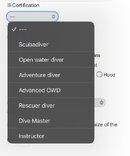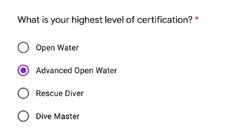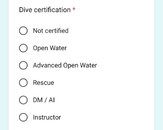Okay thank you
@Boarderguy and
@Zef
Regarding 1) I find it confusing how dive ops ask for highest certification.
I just checked 3 of them, they’re not related to one another and are in fact located in 3 different continents.
They all have the same hierarchy it seems, which includes Rescue in this order.
That’s the reason of my question 1)
You seem to be stuck on the idea that Rescue Diver certification is a part of a training hierarchy, despite acknowledging in an earlier response that it is "ancillary" training. You can continue to delude yourself of this, or you can accept that dive training organizations just use a flow-chart like graphic/list to show what they offer, and that the position of Rescue Diver in that graphic/list is because there is an expectation that one has a modicum of experience before taking that course whether that experience is an actual agency requirement or not....I don't even believe the agencies care other than that you are
paying for the course and the instructor is following the agency's standards when teaching it.
Another poster mentioned that those certification questions on dive op forms are for marketing purposes. The information is also used for statistical analysis by the dive op and the agencies whose umbrellas they are under.
You can akeep asking the same question, rephrased in however many different ways, but the answer will remain the same....carry/present your AOW card (or DM, AI, Instructor card if you have one and desire to show it), as there are no guarantees that your Rescue card will be accepted as a credential that allows participation on a chartered dive.
Or you can chance it and do whatever you want as an adult, and if your chosen dive op accepts it, you get to dive, and if they don't, you get to argue with them until they tell you to pound sand. You can also call/email the dive op you plan to participate with and ask, but like I mentioned in my previous post, a dive op may accept a Rescue cert as valid one day and they may not the next...it is up to the shop and their liability insurance provider....they may tell you over the phone or by email that they do accept it and then use your question as the basis to get clarification from their insurance provider who tells them no they need to see a primary training card (OW/AOW/DM/AI/I) and forget to contact you. Then you can have them do a diver verification lookup on the website of whatever agency you are certified through.....
......Just check that you are listed before you travel because if your training was outside the US then the regional office might not automatically add you to the digital database lookup, as an example, NAUI Europe does not consistently automatically add divers credentials to the NAUI diver verification database. I had to send scans of my wife's and daughters' certification cards to a point of contact at NAUI US to have them added. And PADI Europe won't list my that I am qualified to teach "Discover Scuba Dive" because I did not have active liability insurance when my DM instructor finally sent them the paperwork, due to the fact that I was in the midst of a move back to the US in an area where my diving opportunities would be more limited and my European based professional liability insurance would not be valid anyway....and PADI US has little contact and file sharing with PADI Europe, so PADI US has no record of my DSD teaching qualification...nice eh?! If PADI US had a copy of the paperwork stating I completed the prerequisites they would list it among my credentials, but would list my teaching status as "not active" or some such until I provided them proof of professional liability insurance....PADI Europe operates differently...who would have thunk it!
OR you can just carry your primary training certification card when you travel and/or participate on dive op led dives....not sure why that is such a difficult thing to accept and do.
Vous etes majeur et vacciné!
-Z







